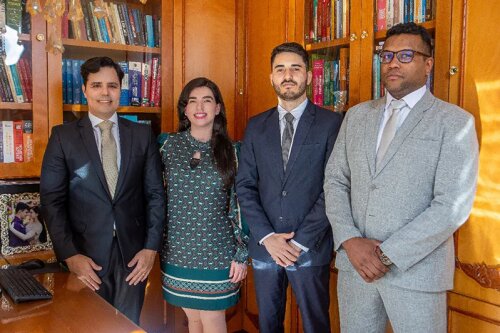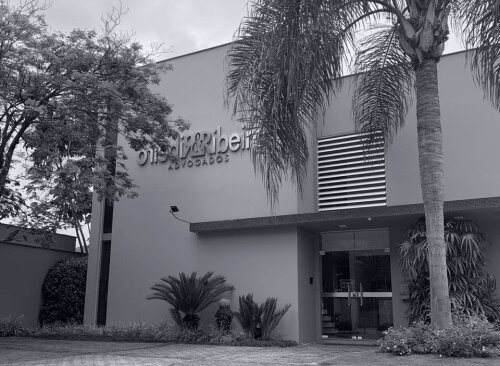Best Biotechnology Lawyers in Brazil
Share your needs with us, get contacted by law firms.
Free. Takes 2 min.
Or refine your search by selecting a city:
List of the best lawyers in Brazil
About Biotechnology Law in Brazil
Biotechnology in Brazil is a thriving industry that encompasses a wide range of activities, including genetic engineering, pharmaceuticals, agriculture, and environmental sustainability. The field is regulated by various laws and regulations to ensure the safety and ethical use of biotechnological innovations.
Why You May Need a Lawyer
Individuals or companies involved in biotechnology in Brazil may encounter legal issues related to intellectual property rights, regulatory compliance, contract disputes, environmental regulations, and more. A lawyer specialized in biotechnology law can provide valuable assistance in navigating these complex legal matters.
Local Laws Overview
Key aspects of local laws that are particularly relevant to biotechnology in Brazil include the Biosafety Law, which regulates the use of genetically modified organisms, the Industrial Property Law, which governs patents and trademarks, and the Environmental Law, which sets guidelines for sustainable biotechnological practices.
Frequently Asked Questions
1. What are the key regulations governing biotechnology in Brazil?
In Brazil, the Biosafety Law, Industrial Property Law, and Environmental Law are the primary regulations governing biotechnology activities.
2. How can I protect my biotechnological inventions in Brazil?
You can protect your inventions through patents, trademarks, and industrial designs, which are regulated under the Industrial Property Law in Brazil.
3. What are the ethical considerations in biotechnology in Brazil?
Ethical considerations in biotechnology in Brazil are governed by the National Biosafety Commission and various research ethics committees that oversee biotechnological research involving human subjects.
4. What are the requirements for conducting biotechnological research in Brazil?
Researchers conducting biotechnological research in Brazil must comply with the regulations set forth by the National Biosafety Commission and obtain the necessary permits and approvals.
5. How are biotechnological products regulated in Brazil?
Biotechnological products are regulated by the National Health Surveillance Agency (ANVISA) and the Ministry of Agriculture, Livestock, and Supply.
6. What are the penalties for non-compliance with biotechnology regulations in Brazil?
Non-compliance with biotechnology regulations in Brazil can result in fines, seizure of products, suspension of activities, and even criminal liability in severe cases.
7. Can foreign companies invest in biotechnology in Brazil?
Yes, foreign companies can invest in biotechnology in Brazil, but they must comply with the relevant regulations and obtain the necessary permits and approvals.
8. How can a lawyer help me in resolving a biotechnology-related dispute in Brazil?
A lawyer specialized in biotechnology law can provide legal advice, represent you in negotiations or court proceedings, and help you protect your rights and interests in a biotechnology-related dispute.
9. Are there any specific tax considerations for biotechnology companies in Brazil?
Biotechnology companies in Brazil are subject to corporate income tax, social contributions, and other taxes, so it is important to consult with a tax lawyer to ensure compliance with tax regulations.
10. How can I find a reputable lawyer specializing in biotechnology law in Brazil?
You can search for lawyers specializing in biotechnology law through legal directories, professional organizations, or recommendations from colleagues or industry contacts.
Additional Resources
For more information on biotechnology regulations in Brazil, you can refer to the National Biosafety Commission, Ministry of Agriculture, Livestock, and Supply, National Health Surveillance Agency (ANVISA), and Brazilian Patent and Trademark Office.
Next Steps
If you require legal assistance in biotechnology in Brazil, it is recommended to consult with a lawyer specializing in biotechnology law who can provide guidance tailored to your specific needs and circumstances. Be sure to gather all relevant documents and information related to your case before seeking legal advice.
Lawzana helps you find the best lawyers and law firms in Brazil through a curated and pre-screened list of qualified legal professionals. Our platform offers rankings and detailed profiles of attorneys and law firms, allowing you to compare based on practice areas, including Biotechnology, experience, and client feedback.
Each profile includes a description of the firm's areas of practice, client reviews, team members and partners, year of establishment, spoken languages, office locations, contact information, social media presence, and any published articles or resources. Most firms on our platform speak English and are experienced in both local and international legal matters.
Get a quote from top-rated law firms in Brazil — quickly, securely, and without unnecessary hassle.
Disclaimer:
The information provided on this page is for general informational purposes only and does not constitute legal advice. While we strive to ensure the accuracy and relevance of the content, legal information may change over time, and interpretations of the law can vary. You should always consult with a qualified legal professional for advice specific to your situation.
We disclaim all liability for actions taken or not taken based on the content of this page. If you believe any information is incorrect or outdated, please contact us, and we will review and update it where appropriate.
Browse biotechnology law firms by city in Brazil
Refine your search by selecting a city.














